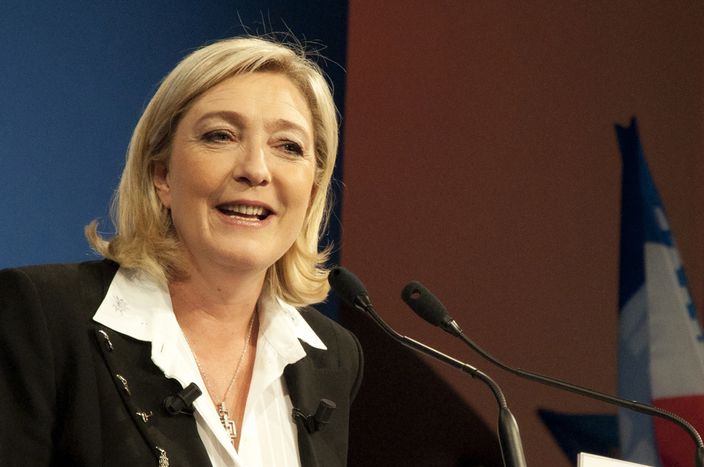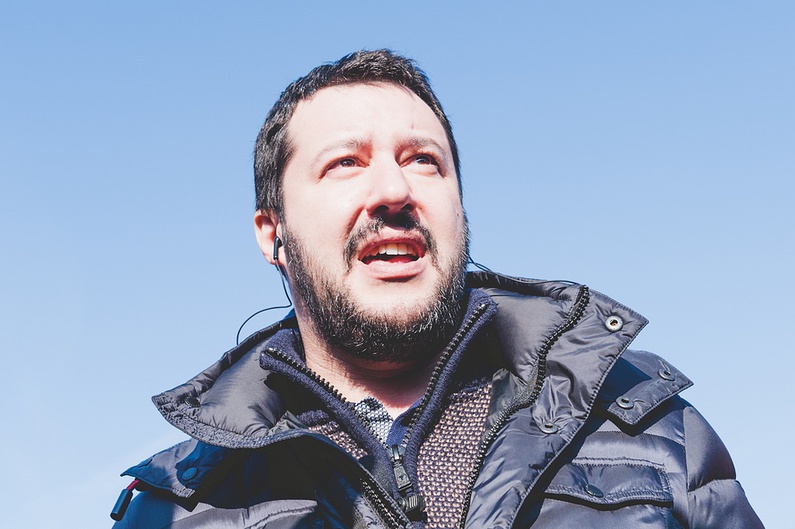
MENF: a Europe that doesn't like Europe
Published on
Translation by:
Sofia RabatéAs if the Europe of Freedom and Democracy (EFD) party wasn't enough, now Marine Le Pen and Matteo Salvini are creating their own political party. Against the currency union and immigration, it's a parliamentary group that's against Europe itself. It's called MENF, the Movement for a Europe of Nations and Freedom. It's completely paradoxical. And that's all the better. Let me explain.
They dreamed of it, and they did it. Joined by European deputies of two other nationalities, they reached the quota of the required 7 nationalities to create a group represented in the Brussels Parliament. The Europe of Nations and Freedom party (MENF) was born. As its leader, Marine Le Pen, with Lega Nord's Matteo Salvini as a deputy, declared on June 16, 2015, that "the birth of this European group ends the monopoly of socialist scheming and Christian democracies: finally in Brussels a healthy opposition is born, strong and brave against currency union and a single opinion."
In short, these representatives are European right-wing populists and eurosceptics: there's Dutchman Geert Wilders of the Party for Freedom, who declared that the Qu'ran is an "Islamic Mein Kampf" and advocates for the banning of Islamic immigration in Holland. Then there's Janice Atkinson, who called a Thai woman a "ting tong," causing embarassment for UKIP leader Nigel Farage who expelled her from the party last March because of embezzlement.
Added to this are a European Deputy of Vlaams Belang, the Flemish nationalist party, the Polish party Congress of the New Right (who advocates for the abolition of income taxes, the re-establishment of the death penalty, and is against gay marriage and abortion, among other things).
Finally there's the Freedom Party of Austria (FPO) with four European deputies (FPO was the party of Jorg Haider, who was well known for his anti-semitism and the fact that he had ex-Nazis among his acquaintances). And when it comes to Salvini, he speaks for himself. A pure product of the Lega Nord, he supported the northern regions of Italy that refused to welcome migrants, and is accompanied, among others, by Gianluca Buonanno, the mayor of the little city of Borgosesia, who prohibited homosexual couples from kissing in public, and proudly displays a picture of Putin in his office. In short, the cream of the crop.
Dura lex sed lex
The group will sit at the heart of the European Parliament. It will be able to present its amendments, deliberate law projects, express themselves publicly. The parties will receive assistants and secretaries, and 2.43 million euros a year, the same ones who for so long criticized the class of professional politicians, and spat at Brussels, their new patron. Dura lex sed lex, the Romans said: the law is harsh but it is the law.
Yet, that's also what democracy is. By respecting it, it's not only the laws and freedom of speech that are being respected: it's also a way to mitigate the effects of populist parties! The extreme right and the populists have many things in common, but parties like Lega Nord, UKIP, or the Front National, are not "fascists," even though they sometimes claim to be and have, in some cases, come close to fascist ideology (the National Front, born in 1972, still uses the logo of the tricolour flame). But the Lega Nord, for example, is another type of reactionary right since it is secessionist, while the UKIP is an identity party of yet another type.
The extreme right is joining a tradition that includes the existence and respect (used loosely) of a political class, whose rules it accepts to join it. Populism, on the other hand, flouts the political class and dedicates a cult to the average worker. In permitting right-wing populists to install themselves in the institutions, we do allow them to express themselves more easily - which is one of the risks - but we also cut off their identity at the root. Populists complain about the political class that drifts away from the world's reality while living in a fantasy land of comfort?
Very well, let's give them access to that life, they will find they rather like it, perhaps they will show themselves suddenly to be less desperate, more willing to negotiate with Brussels. Their activists will end up seeing in them the same defects they criticised in other parties. Bread and circuses? Basically, yes.
Translated from Le MENL : l'Europe qui n'aime pas l'Europe



